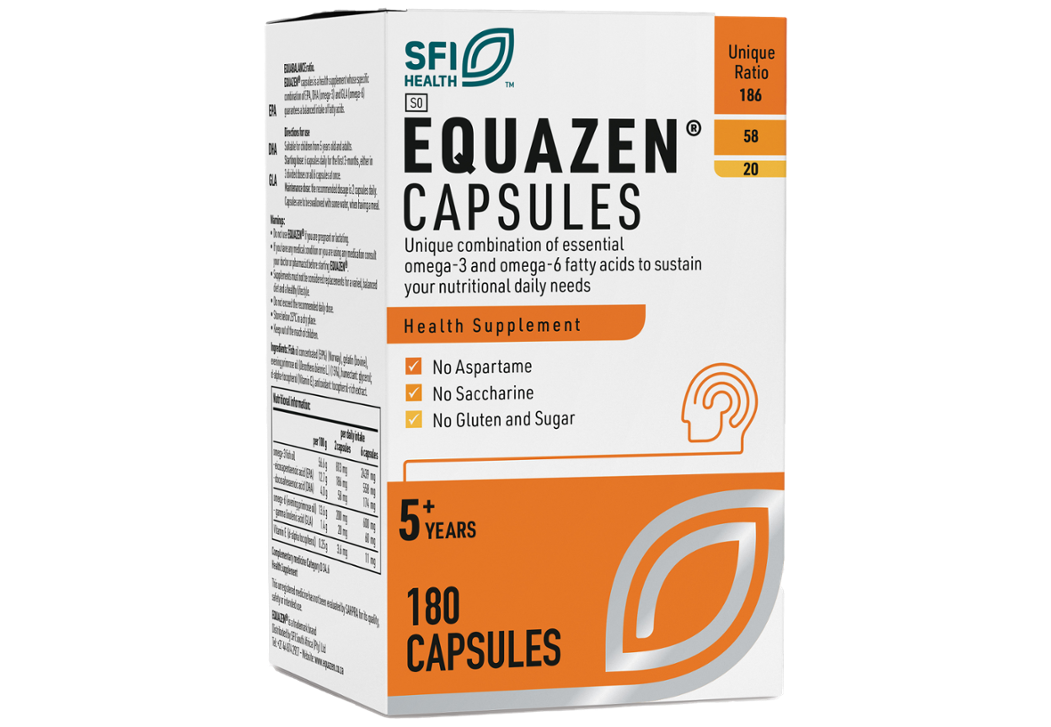FREE SHIPPING ON ALL ORDERS
Supports concentration, learning and healthy brain development in children and adolescents 1-4

As a completely natural and normal part of growing up, your child’s attention will undoubtedly become challenged. Are you beginning to notice that they may need more help concentrating? Or are they finding it difficult to keep up at school? Childhood into adolescence is tough and requires a lot of brain power as your child continues to explore boundaries and try new things. It’s important to ensure they are getting all the essential nutrients for healthy brain development—including essential fatty acids (EFA). Adding Equazen to their diet provides EFA supplementation that can help give them the support they may need to increase concentration and improve learning capabilities.
Equazen Capsules are clinically researched to help support children and adolescents 5+ years with learning and behavioural concerns. Equazen Capsules have the same key ingredients as the Equazen range.
Equazen Capsules has been researched in multiple clinical studies involving both mainly children and also adults. The evidence demonstrates the beneficial effects of the Equabalance ratio of EPA:DHA:GLA = 9:3:1 used in the EQUAZEN range, with significant improvement in concentration and learning development including patients with ADHD, ADD, Dyspraxia and Dyslexia. 3, 9, 11, 16, 17, 18
Are you health professional? To gain full access to exclusive practitioner only information, register or sign in now.
By increasing attention span and focus
Such as reading, writing and drawing
By providing necessary essential fatty acids support for brain development
Omega-3 and Omega-6 are essential fatty acids that are vital for good health. Since your body is unable to produce some of these essential fatty acids, they must be obtained through your diet.5
Equazen is a unique composition with a scientifically proven ratio of EPA:DHA:GLA = 9:3:1, which has been proven to help improve cognitive functions in children who had learning difficulties. EPA, DHA and GLA all play an important role in brain development.2,6
Food for thought: Did you know that children who are displaying signs of inattention may have different levels of Omega-3 and Omega-6 in their blood? Adding Equazen to supplement their essential fatty acids intake may help.
We take great pride in our unique Omega-3 with Omega-6 food supplements and use only the best ingredients and pharmaceutical standard processing techniques, in order to maintain the high quality that our customers have come to expect over the years.
Suitable for use in children aged 5 years onwards
Starting dose: Take 6 capsules per day for the first 3 months
Maintenance dose: Take 2 capsules per day thereafter
Always read the label and follow the instructions for use.
Equazen is well tolerated. Tolerability data from clinical investigations as well as the post-marketing experience support the safety profile of Equazen formulations.
Equazen® gelatine used in the clear capsules is certified halal.
Each capsule contains:
Omega-3 fatty acids (fish oils) 400mg of which:
EPA (eicosapentaenoic acid) 93mg
DHA (docosahexaenoic acid) 29mg
Omega-6 fatty acids (Evening primrose oil, Oenothera blennies L.) 100mg
GLA (gamma-linolenic acid) 10mg
Packaging and product claims may vary depending on country-specific regulations. Products available in selected markets only.
References